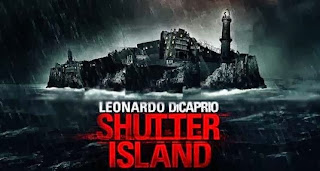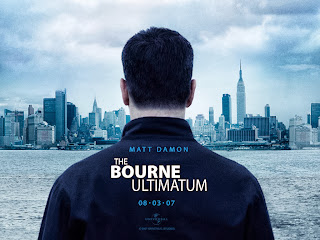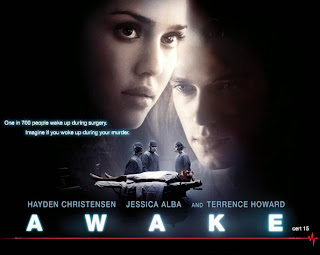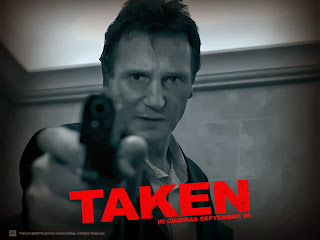Shutter Island is a typical thriller film because it is littered with enigma codes, red-herrings, narrative retardation and morally complex characters. The opening is extremely dramatic and tense especially with the music and the views of the hospital are similar to that of a concentration camp which makes the audience automatically associate it with pain, suffering and torture. The enigma codes include why Teddy's assistant is so inexperienced and why all the guards are so tense and frightened within Teddy's presence. The whole film is a red-herring really as you discover Teddy's true identity and the real reason behind his presence at the hospital. Also, lots of the flashbacks are narrative retardation as they make the audience more confused about Teddy's past life and his wife and children. Teddy is an extremely morally complex character as you think you have figured out all there is to him and then more information confuses and when you discover his true identity at the end, you feel like everything you've thought throughout the film was pointless and stupid.
The sixth sense is a very psychological thriller not because it scares you but because it really makes you think about things. It's also very complex and so the audience need to think about lots of different aspects. In this thriller there are so many enigma codes that with first viewing you miss and feel so stupid afterwards because it was so obvious but at the time you are more focused on the plot than the supposedly insignificant twists. Also, Levi Strauss's binary opposite's are included as a main theme as there are the living and the dead in one place at one time. Also, the music throughout the film is incredibly tense which leaves you on the edge of your seat.
Casino Royale is a spy thriller and would also count as an action film but because it is littered with plot twists and turns, red-herrings, chases/pursuits and narrative retardation it is very much a thriller film. The plot twists and turns, red-herrings and narrative retardation are based on the same thing but all count. For example, the femme fatale, that James Bond risks everything for, that throughout we think is perfect and lovely ends up betraying his trust which turns her into an evil and a character we end up not trusting. But as she is, typically for a thriller film, the femme fetale he of course again risks his life to try and save hers even though she betrayed him. And of course it isn't a James Bond film or a spy-thriller film without some chases and pursuits or some gun fights, in which there are many in this film which is one of the reasons it is also so typically a thriller film.
Jaws's tense music is probably the most well known in the world. It builds up after time getting faster and faster as if something is getting closer and closer which is what makes it so tense and scary. Although it counts as a thriller because of the deadline and chases/pursuits, as it was in 1975 it was made as more of a horror film to entertain and scare people, it's only because of the technology today people don't find it as scary as the did then. The typical thriller convention of having a deadline makes films more tense and under pressure. In this scenario they need to kill the shark before it kills any other people which is the deadline. Also, the chases and pursuits consist of the shark chasing people to attack them and then people chasing the shark to capture and kill it. Throughout the entire film there are chases and pursuits which is what makes it a thriller film.
The Bourne Ultimatum is a thriller film littered with conventions. There are deadlines, concealment, narrative retardation, enigma codes, morally complex characters and red-herrings. There are so many hints at the audience about Jason Bourne but only little things that within the first viewing you would miss but at the end of the film after knowing the truth you would feel stupid for missing. Bourne is a very morally complex character as you think he is one person then his identity has changed. The whole film is based around how Bourne knows that his identity was changed and he wants to know how and why so already his character is changing a lot which confuses the audience. Also, most of the film consists of narrative retardation as throughout the first viewing the audience is confused by all the red-herrings and misdirection. Also, typically of a thriller film there are also many chases and pursuits to build up tension and a sense of a deadline.
Saw is very much a psychological thriller. It would be classed as a horror as well but it contains a few conventions that make it a thriller film. Every part of the film contains a deadline when the victims have to escape their traps within, usually 1 minute, a time period. Also, there is a lot of narrative retardation when trying to figure out the mastermind, the jigsaw, behind all the incredibly nasty psycho pranks. Also, there are quite a few plot twists and turns which makes the film more entertaining but also more tense and creates more suspense which are other reasons why this film is a thriller.
The Ghost (The Ghost Writer) is a thriller film and has very many conventions to support this. Even though it isn't a thriller convention it follows the three-act-structure as it starts off with someone dying but only a quick view and so we assume it's an enigma code and will discover why later but then it develops into the ghost being interviewed for a job which all are the beginning. Then whilst on the job things start happening and red-herrings start coming into place along with narrative retardation and misdirection to confuse the audience and make them believe or think something else and so they are surprised with the end result. Then the ending comes into place with resolutions but ends with a thriller convention of a cliffhanger. Throughout the entire film there are many morally complex characters as we find we are unsure whether many of the characters are good or bad. Also there are many multiple lines of action as the majority of the time there is more than one action at time, or at least more than one story line for the audience to follow which is good for confusing the audience.
This film is a psychological thriller. The whole film revolves around the central question of when Clay is in surgery and mentally wakes up and discovers that everyone he trusted he shouldn't have and the film is all about him being awake whilst being operated on and he over hears his wife and close friend planning his murder. All of the main characters are quite morally complex because you think the film at the beginning is happy and good and then all the characters change and suddenly become something so different from what you originally thought. A lot of the plot at the beginning is a red-herring as everything is not what it seems.
Taken was a typical action packed thriller film. There were so many conventions which make it a thriller film for example in many shots - including when Kim was taken - there was concealment as you could only see the hands or feet of someone and not their face. This also happened when Bryan was talking on the phone with the kidnappers as he could only hear their voices and so he didn't know what he looked like. Also, there was quite a lot of red-herrings and narrative retardation. You think you we see Kim and then it's someone who looks similar and also you feel like Bryan has found the man who kidnapped her and then you're mislead and it's not him or it's only an associate. There are lots of chases and fights which typically are action or thriller and this is both. Also there is a massive enigma code, obviously within the title, but when Bryan says to Kim about how he knows the real world and how bad things happen which foreshadows what will happen later on in the film.
.jpg)
.png)
.jpg)
.jpg)
.jpg)
.jpg)



No comments:
Post a Comment